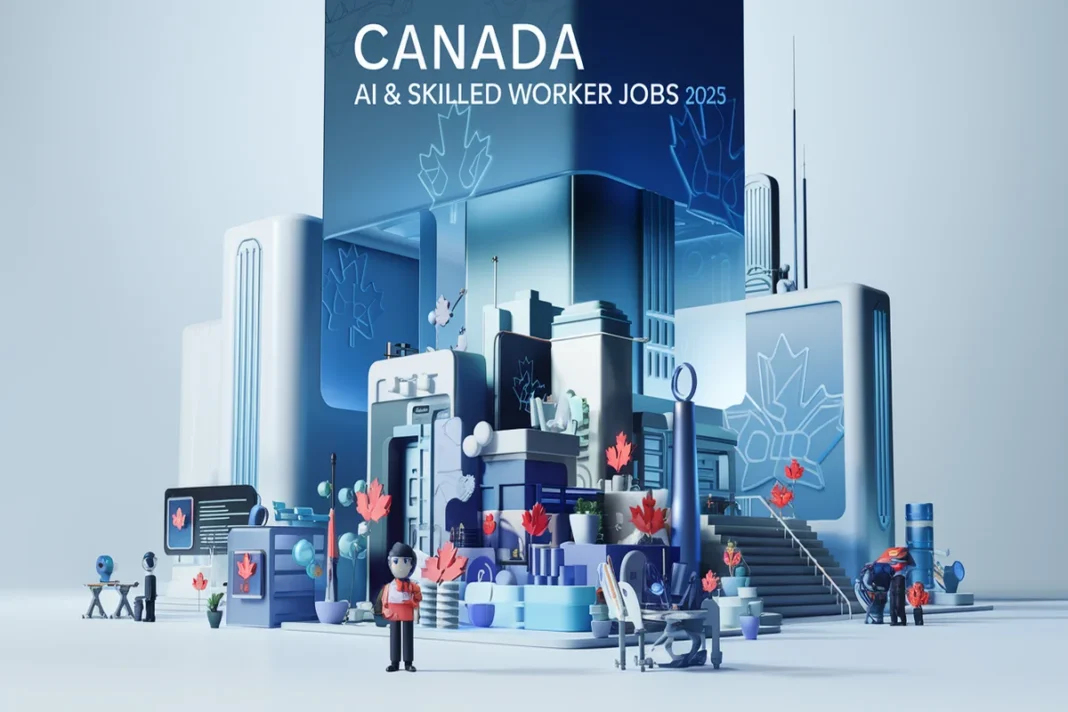Canada is experiencing a significant shortage of skilled workers across sectors like AI, technology, skilled trades, and healthcare, making 2025 an ideal time for international job seekers to pursue Canada skilled worker jobs. With the right qualifications and experience, you can take advantage of immigration programs designed to fill these in-demand roles. This guide outlines high-demand job opportunities, expected salaries, and the complete process to secure skilled worker jobs in Canada.
AI and Technology Jobs in Canada for 2025
AI and Technology Roles for Canada Skilled Worker Jobs in 2025
Canada’s AI sector continues to expand, with high demand for skilled professionals. Here are the top AI roles, along with average salaries and key qualifications.
- Machine Learning Engineer
Salary: CAD 80,000 – CAD 120,000 annually
Qualifications: Degree in Computer Science or related fields, Python proficiency, experience with machine learning libraries (e.g., TensorFlow, PyTorch). - Data Scientist
Salary: CAD 70,000 – CAD 110,000 annually
Qualifications: Degree in Statistics, Mathematics, or Computer Science; skills in R, Python, and data visualization tools like Tableau. - AI Research Scientist
Salary: CAD 90,000 – CAD 150,000 annually
Qualifications: PhD in AI, Machine Learning, or related fields; strong research background with published papers in AI. - NLP Engineer
Salary: CAD 80,000 – CAD 125,000 annually
Qualifications: Degree in Computer Science or Linguistics; experience with NLP libraries like NLTK, SpaCy; programming skills, especially in Python. - Computer Vision Engineer
Salary: CAD 85,000 – CAD 130,000 annually
Qualifications: Degree in Computer Science, experience in image recognition technologies, and proficiency in OpenCV and linear algebra. - AI Ethics & Governance Officer
Salary: CAD 90,000 – CAD 140,000 annually
Qualifications: Degree in Law, Ethics, or Computer Science; expertise in AI ethics and policy.
Read more: Entry-level AI jobs in Canada with a rewarding salary and flexible work
High-Demand Skilled Trades Across Canadian Provinces
The demand for skilled tradespeople continues to rise due to infrastructure projects and an aging workforce. Canada’s “Red Seal” endorsement certifies tradespeople to work across provinces.
Top Skilled Trades, Salaries, and Requirements
- Electricians
Salary: CAD 50,000 – CAD 100,000+ annually
Qualifications: 4-5 years of apprenticeship, provincial certification, and Red Seal endorsement. - Plumbers
Salary: CAD 50,000 – CAD 100,000+ annually
Qualifications: Apprenticeship, provincial certification, and Red Seal endorsement for cross-province work. - Welders
Salary: CAD 45,000 – CAD 90,000+ annually
Qualifications: Apprenticeship or technical training with provincial certification; specializations like underwater welding can increase pay. - Carpenters
Salary: CAD 45,000 – CAD 90,000+ annually
Qualifications: Apprenticeship completion and provincial certification; Red Seal endorsement offers greater mobility. - Heavy Equipment Operators
Salary: CAD 50,000 – CAD 100,000+ annually
Qualifications: Equipment-specific training and, in some cases, additional licensing. - HVAC Technicians
Salary: CAD 45,000 – CAD 80,000+ annually
Qualifications: Apprenticeship or technical training with provincial certification; specialization in areas like refrigeration is beneficial.
Healthcare Sector Skill Shortages in Canada
Canada’s healthcare system faces a critical shortage of professionals, especially in rural areas. Below are some of the high-demand healthcare roles with salary ranges and qualification requirements.
In-Demand Healthcare Professions
- Nurses (Various Specializations)
Salary: CAD 60,000 – CAD 100,000+ annually
Qualifications: BSN degree and registration as an RN or RPN. - Medical Laboratory Technologists
Salary: CAD 50,000 – CAD 85,000 annually
Qualifications: Diploma in Medical Laboratory Technology, CSMLS certification. - Radiologic Technologists
Salary: CAD 60,000 – CAD 90,000 annually
Qualifications: Diploma in Radiologic Technology, CAMRT certification. - Personal Support Workers (PSWs)
Salary: CAD 35,000 – CAD 60,000 annually
Qualifications: Certificate program, varying by province. - Physicians (Especially in Rural Areas)
Salary: CAD 200,000+ annually
Qualifications: Medical degree, residency, and provincial licensing. - Dietitians
Salary: CAD 55,000 – CAD 85,000 annually
Qualifications: Bachelor’s degree in Nutrition, provincial registration.
Where to Find Canada Skilled Worker Jobs in 2025
Locating in-demand jobs is crucial for immigrants and job seekers in Canada. Here are key resources to help you identify these opportunities:
- Trend Analysis on Job Bank: View job projections and demand by occupation.
- Job Match on Job Bank: Browse active job postings across Canada by occupation and location.
- Provincial Government Websites: Provinces provide updated in-demand jobs lists based on local needs.
- ICTC Resources: Get insights on digital skills and labor gaps in tech and AI fields.
Roadmap to Apply for Jobs and Seek Canadian Immigration in 2025
To enhance your chances of immigrating to Canada for work, follow this preparation roadmap:
- Skill Assessment and Certification: Verify that your qualifications align with Canadian standards. Obtain Red Seal endorsement if you’re in a trade profession.
- Language Proficiency: Pass language tests like IELTS or TEF for English or French proficiency, often needed for immigration and certification.
- Research and Networking: Use LinkedIn and other platforms to connect with Canadian employers. Attend relevant industry events and conferences.
- Explore Immigration Programs: Look into the Federal Skilled Worker Program, Provincial Nominee Programs, and Global Talent Stream for immigration pathways tailored to skilled workers.
- Further Education or Certification: Consider Canadian educational credentials to boost employability. Completing local certifications may help meet specific job requirements.
Conclusion: Start Your Canadian Immigration Journey for 2025
Canada’s favorable immigration policies, paired with current labor shortages, make it an attractive option for skilled international job seekers. By aligning your skills with Canadian market demands and preparing your application carefully, you can maximize your chances of successful immigration and career advancement.
FAQs on Canadian Job Market and Immigration for Skilled Workers
1. What is the average processing time for Canadian work visas?
Processing times vary based on the program, ranging from a few months for Provincial Nominee Programs to over a year for other skilled worker pathways.
2. Do I need a job offer to apply for Canadian immigration?
Some programs, like the Federal Skilled Worker Program, do not require a job offer, though having one can strengthen your application.
3. How important is language proficiency in the immigration process?
Language skills are critical, with most programs requiring tests like IELTS or TEF. Higher scores can improve your overall immigration score.
4. Are there specific AI roles prioritized for immigration?
Yes, roles such as data scientists, machine learning engineers, and AI researchers are often prioritized, especially under tech-focused programs like the Global Talent Stream.
5. How can I apply for a Red Seal endorsement?
If you are a tradesperson, you can apply for Red Seal endorsement by challenging the Red Seal exam or through provincial trade certification, allowing you to work across Canada.
By following these steps and continuously enhancing your qualifications, you can increase your odds of establishing a successful career in Canada.


